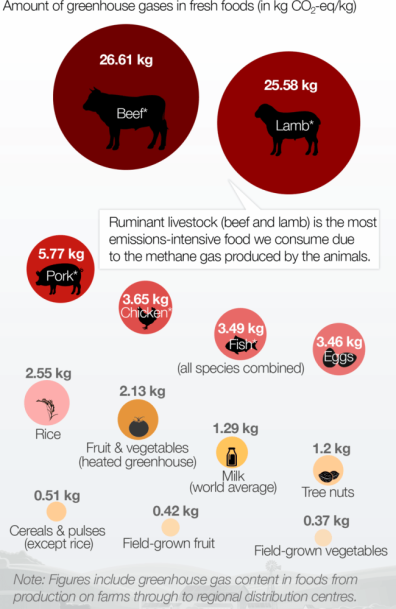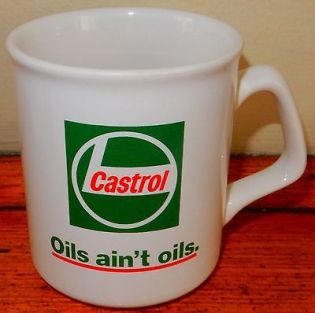If you’ve ever spent time with an environmental vegetarian you’ll likely empathise with my frustrations at being preached at for being a lowly omnivore. Of course, there are many reasons to choose vegetarianism over other religions including those of ethics and health. I believe the ethical one is a personal choice so I won’t investigate it here but the environmental and health arguments can be debated with science so I will explore those, whilst attempting not to prosthelytise.
The Environmental Argument
Recent research from RMIT and Lancaster University found that the food we eat contributes approximately one third of our total carbon footprint. This comes from a full life-cycle analysis including everything from fertiliser for crops, methane from cows, fuel required in transportation and energy consumed in processing. The results show, perhaps unsurprisingly, that meat production is the most emissions intensive food – by an order of magnitude in some cases.

Red meat is by far the least sustainable food we can eat. Much of this is because of the methane released due to rumination in grazing animal’s stomach and then burped out, but they’re also often farmed with unsustainable practices leaving pastures with lower nutrient soils than when they started. It must also not be forgotten that many grazing animals are fed with grain which has been farmed so the negative environmental effects are multiplied. What’s also worth pondering is that rice, the staple carbohydrate for more than half of the world’s population, is the most unsustainable non-animal-based food. Apart from it’s high emissions profile, it also requires large volumes of water for production – not ideal on a warming planet!
Personally, what surprised me most from these results was the almost six-fold difference in emissions between greenhouse-grown and field-grown fruits and vegetables. I suspect a considerable proportion of the emissions from greenhouse-grown delicacies is from the energy required to run the process and this varies by region according to what energy source is used.

For example, in Australia where only 6% of electricity is generated renewably the emissions intensity of a greenhouse is much higher than the same greenhouse in, say, New Zealand where 40% of electricity is renewable. The key takeaway here is that vegies ain’t vegies. If you’re eating to help the environment, know where your vegies are coming from.
This may not be the case forever, though. A few months ago I wrote about the huge potential of aquaponics to provide sufficient feed for our growing population and do so sustainably.
Recently our friends at the CSIRO set out to investigate the emissions from cows eating seaweed compared to conventional feed. Interesting this is an ancient Greek and Icelandic practice which was resurfaced by a Canadian farmer last decade. The research shows that one particular variety of seaweed reduced methane production by 99%! So this research shows that beef may not need to be removed from the environmentally conscious carnivore’s table forever. With 1.3 billion people world-wide depending on livestock for their livelihoods, this research could have very far-reaching effects. What’s more, most seaweed is free-range so it would have grown anyway and the only emissions from it’s use would be in harvesting it.
The Health Argument
This is very much an argument, since the scientific jury is still out. Some studies show a significant increase in longevity in vegetarians compared to meat-eaters. Many of these studies, whilst being statistically relevant in sample size, struggled to control for other lifestyle factors as well as quantity and quality of meat consumed. In essence, as anyone fond of the Freakonomics series knows, correlation does not equal causation.
And of course an increase in life expectancy is not synonymous with better health. Here, what has been shown is that a vegetarian diet can reduce risk of chronic disease such as diabetes and heart disease. What’s important to note, however, is that a vegetarian diet –if not well planned– can negatively impact health. If key nutrients, vitamins and minerals are neglected a vegetarian diet can lead to conditions such as anemia which can have lasting long-term health affects.
The Decision
Shamelessly, I enjoy eating meat. All varieties and flavours. That said, I accept the science which shows the long-term health benefits of going vego (and vegan). After all, one rarely sees an obese vegetarian. But as a believer in evolution, I cannot perambulate the evidence that humans evolved into the brain-heavy mammals we are today due (in part) to our consumption of meat and so there are benefits. Here lies the basis of a deep internal conflict since I am also an environmentalist and it is simply irresponsible for human kind to continue consuming a product at historical volumes which is so carbon intensive.
Where does that leave me? As the great Oscar Wilde said “Everything in moderation, including moderation.” A good friend of mine has been trialling a vegetarian diet five days out of 7 with great success. I’m going to do the same with two additions. Firstly, wherever possible I’ll make sure my vegies are field-grown. Secondly, one of my carnivorous days will involve pescatarianism. Line caught fish is one of the last true sources of free-range animal protein. As long as it’s sourced sustainably, it belongs on my plate. Whilst I’ll be trimming right back on red meat, I can’t sentence myself to a lifetime without a rare T-bone. The compromise is keeping it as an occasional treat. Now, who’s with me?


Thank you for writing about this important topic.
Some points:
You really don’t need animal proteins to survive and flourish. See many articles for more info, but this is one.
http://www.richroll.com/blog/slaying-the-protein-myth/
Taste and choice. You may enjoy the taste, but how do you rank the importance of taste against the future of our world? (Not to mention your health and the immense satisfaction that avoiding the suffering of thousands and thousands of cute cuddly creatures can bring.) I know it seems like it’s too hard to be a vegan, but I feel like you can’t say that till you try. So why don’t you Veganuary this January!
https://veganuary.com
Good luck with the 5/7 anyway. But let’s see if you can find the heart, courage and good sense to go the whole way!
LikeLike
Hi Aileen,
Thanks for reading! It’s serendipitous that you link to Rich Roll’s website because I just finished watching this: http://www.foodchoicesmovie.com/ which features him and his opinions on the vegan lifestyle as it relates to fitness. That documentary has some really interesting points and It’s actually changed my thinking on the importance of meat in our diets as we evolved. The concept that, as hunter-gatherers we were much more effective at gathering fruit, vegetables and nuts than we were at hunting rings true with me. Which means we probably evolved eating meat much less regularly than we currently do. I also have some further research to do on milk products because it is conceptually pretty strange that we drink the milk of another species through all stages of life — that’s a lot of hormones!
As I discover more and more information on plant-based diets I am intrigued as both an environmentalist and a health-conscious dude. I’m not yet ready to go the full hog, but I am going to do the 5/7 vegan instead of vegetarian. Wish me luck.
~DS
LikeLike